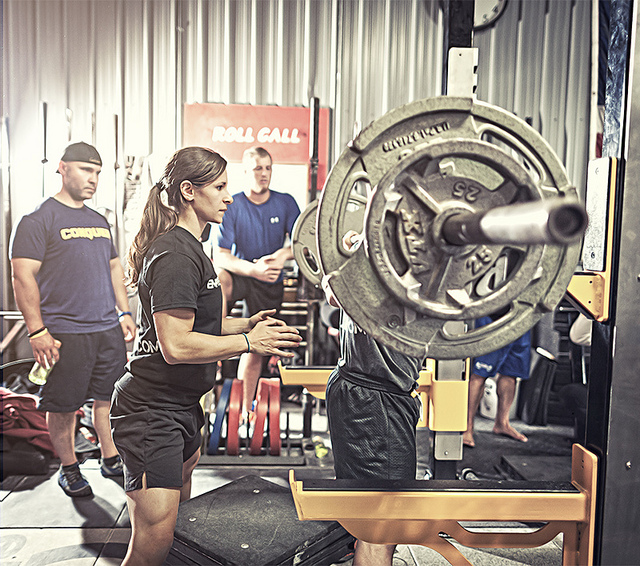
As I sat here reading the new articles on EliteFTS.com, I wondered why many of the authors weren’t female. So, instead of wondering, I started writing. I know there have been a couple articles about strength coaches and why they suck. I’ve even read a few posts on EliteFTS.com about some high school or college coaches who also powerlift (heaven forbid the coach actually lifts weights himself). But I really wanted to share my thoughts and views as a female powerlifter and Division I strength coach (a minority in both fields).
So here are just a few of the things I’ve learned along the way…
1) Just like Dave Tate has preached, under the bar experience is what really makes a good coach. I’ve found that the athletes really listen and relate to me when I explain that as I got stronger, I got faster, jumped higher, and became an overall better athlete. How can I tell these kids what to do if I’ve never been in their shoes?
2) You don’t have to stick to Westside training to a “T” when training athletes. Most of the athletes we see have little weight training experience, and the experiences they do have are downright horrible. Build them a base with calisthenics and body weight movements. You can even start them with basic periodization until they grasp the concepts.
3) As athletes get stronger, their “core strength” gets better. As they become more advanced, you can start dialing in more specific exercises. Just keep it simple at first.
4) Athletes think that if their squat or bench didn’t go up in the past five weeks, they aren’t getting stronger. I ran across this with some athletes I train. Reassure them that all the training they did in the last six months is just starting to catch up with them. If you understand the way compensation works, you’ll see a decrease in performance before you see an increase. Be patient and let the program work its course.
5) Read, listen, and learn from everything and everyone. However, don’t jam every single thing into one program. Pick some things you like and try them out. You could even have a couple of your better, more advanced athletes try them, too. You can actually get some good feedback from them.
6) Know when and how to adjust your programs whether the program is your own or your athletes’. We all have days when we just can’t handle a “normal” training day. Or maybe your athletes are beat up from long practices and many games. Know when it’s time to push them through and when it’s time to back off.
7) If you want to gain weight, eat! Don’t come crying to me that you can’t gain weight if you don’t eat anything from 8:00 a.m. until 4:00 p.m. because you have class or work all day. If it’s that important, you’ll find the time to eat.
8) If you want to lose weight, eat less! Better yet, don’t go out and party three nights a week. Is it really that simple? Yeah, for the most part. Athletes don’t understand their own bodies and lives let alone training and nutrition, so keep it simple. If you want to lose weight, cut out the crap and liquid calories, have something small for breakfast (we all know college kids don’t want to get up and eat something in the morning), and workout a little more (even if it’s just 10–15 minutes of extra cardio). Again, if it’s that important, you’ll make the sacrifice.
9) You must gain the trust of your athletes. I quickly found out that there are some athletes who just won’t work hard no matter what you say or do. So you need to get them to believe in you, and they will buy into your program. That’s half the battle. Meanwhile, spend your time with the athletes who want to get stronger. They will listen. And as they get stronger, the “non-believers” will start to buy in.
10) Going back to “Westside” training…if you believe in the conjugate system, great. Utilize some of the principles. But don’t get discouraged when people start bad mouthing strength coaches because they don’t train their athletes “totally Westside” or they do Olympic lifts. Who cares? These are athletes, not powerlifters. Some may be able to utilize the principles of conjugate training, but if they aren’t advanced enough, stick with your program. If you have faith in what you do, so will your athletes.
I know a lot of these are things that we, as strength professionals, already know. But it’s always good to hear it again. I love hearing what other people have learned, even if it’s something I’ve heard a million times. It’s interesting to see how our perceptions, athletes, and training change over the years and how we integrate the things we know into developing better athletes.








